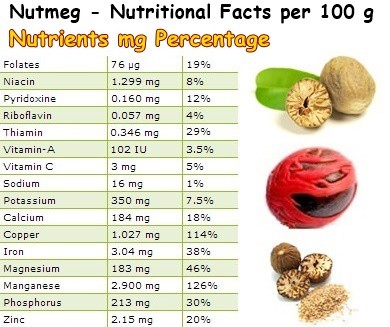Though they are primarily used for culinary purposes, spices are generally a rich source of vitamins, dietary minerals and, most important, powerful antioxidant compounds with wonderful benefits on multiple systems and organs health.
For example, nutmeg, the wonderfully fragrant seed of the Myristica tree, boasts considerable nutritional value. Impressive amounts of copper and manganese make it stand out as a spice with significant antioxidant value, while its overall generous nutritional profile recommends them for consumption.
Nutmeg is rich in dietary minerals in particular, providing generous amounts of magnesium, zinc, iron, calcium and potassium, but also B group vitamins as well as essential oils with anti-inflammatory, anti-tumor as well as antioxidant properties. Spicing your food with nutmeg can be a good idea, however, always remember that spices and herbs are best consumed in limited amounts. Excess intake can lead to side effects, primarily as a result of an increased intake of aromatic compounds from the spice which hold benefits in limited amount and side effects when intake is high.

What does nutmeg look like?
Unripe nutmeg is a bright green, slightly oval fruit the size of a small apricot. As it ripens, the fruit turns a pale yellow-orange color with small smudged brown dots. Because it is highly perishable and has an unappealing tough, sour pulp, the nutmeg fruit (the part enclosing the nut proper) is not suitable for commercialization. As it ripens, it starts splitting and revealing the nut, a source of two popular spices: nutmeg and mace.
Nutmeg is obtained by grinding the small brown nut, while mace is the spice made from the bright red, lace-like outgrowth in between the nut and the pulp.
What is the difference in taste between nutmeg and mace?
Nutmeg is considerably more fragrant and sweeter, while mace has a lighter flavor.
Is ground nutmeg better than whole nutmeg?
It is always best to buy whole nutmeg and grind it yourself. The flavor of freshly ground nutmeg is far more intense. However, if ground nutmeg is all you have, then it works too.

Benefits and side effects of Nutmeg
What are the properties and health benefits of nutmeg?
According to the scientific community, the health benefits of nutmeg derive from its use as a culinary spice alone. The sweet, fragrant aroma of nutmeg is the result of a combination of essential oils, notably myristicin, elemicin, eugenol, safrole, pinene, camphene, dipentene, cineol, linalool and terpeniol. Myristicin and elemicin are essential oils in nutmeg with a direct action of brain chemistry and can interfere with normal nervous system function.
Myristicin, for example, has been found to induce cell death in neuroblastoma cells (a type of cancer cell).
The abundance of essential oils in nutmeg can give any dish a unique, delicate flavor. Additionally, nutmeg oil is used in traditional medicine to treat rheumatic pain and muscle strains.
However, when consumed in excess, raw nutmeg may cause serious side effects.
Nutmeg intoxication symptoms
Nutmeg intoxication is caused by excessive consumption of the spice and can lead to the following symptoms: confusion, dizziness, nausea, headaches, memory and orientation problems, paranoia, eye redness (bloodshot eyes), vomiting, fast heart rate, fainting and even death. So far, there have been two reported cases of death as a result of eating excessive amounts of nutmeg. So remember: you can add a pinch of nutmeg to a dish of your liking to spice it, give it extra flavor, but it is not recommended to eat more than that. The same rule of limited intake applies to other spices and herbs.

Nutmeg nutrition facts
When consumed with moderation, nutmeg can supply the body with a variety of vitamins and minerals and thus contribute to a good overall health. For example, vitamins B1, B2, B3, B6 and B9 contribute to high energy levels because they increase the absorption of nutrients from food. Moreover, they support brain and nervous system function and contribute to digestive health.
Nutmeg is an incredible source of manganese (126% of recommended daily intake, RDI), a mineral with a particularly powerful antioxidant activity which protects cells against free radical damage and thus prevents chronic disease.
Manganese is actually used by the human body in a sort of innate antioxidant reaction (superoxide dismutase) that offers protection against a variety of serious illnesses ranging from degenerative muscle and nerve diseases to neural tube defects in newborns and cancer.
Nutmeg also contains 114% of the RDI of copper, a mineral which can slow down the aging process and prevent premature hair graying and eye discoloring. Iron ensures our tissues get enough oxygen which gives us the feeling we have more energy and vitality. For more information on the properties and benefits of vitamins and minerals, see my vitamins and minerals page.
The spice is a great source of potassium and magnesium, two heart-friendly minerals. Potassium regulates blood pressure and mediates nerve-muscle communication, while magnesium ensures we have a healthy heart muscle.
The spice contains considerable amounts of zinc (20%), making it ideal for strengthening the immune system.
Last but not least, nutmeg is a good source of antioxidant flavonoids such as beta-carotene and cryptoxanthin, which contribute to retina protection and good eyesight. Despite its generous nutritional profile, the spice should be consumed in small amounts, just enough to complement a healthy, varied diet and give flavor to favorite dishes.
